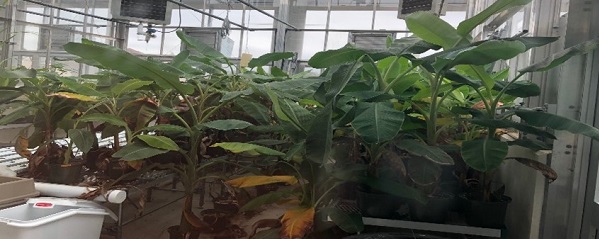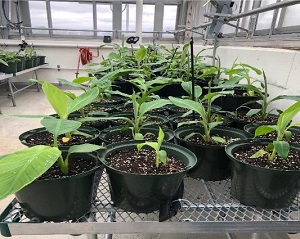Ude Research Lab
George N Ude, PhD
Professor & Chair, Department of Natural Sciences
Office: CNSMN 3101
Email: Gude@bowiestate.edu
Phone: 301-860-3334
Dr Ude’s Plant Genomics Laboratory is dedicated to advancing crop improvement and conservation of Bananas/Plantains through in-depth genomics and transcriptomic studies. Our primary aim involves preserving the germplasms of bananas and plantains, achieved by leveraging our state-of-the-art tissue culture facility through micropropagation to maintain and distribute Musa species with novel traits. The greatest challenges to improving the banana plants under diverse biotic and abiotic stresses are still discoverable. To address this, our lab accomplishes multidisciplinary approaches such as advanced molecular biology, genomics, bioinformatics, and other experimental wet lab work. Within the University's CURE-based undergraduate research program, students actively participate in applied molecular biology, DNA barcoding and metagenomics studies, contributing insights to our understanding of diverse plant and animal species.


Projects
Bananas and plantains germplasm conservation through in-vitro micropropagation
This project aims to mass-produce bananas and plantains using micro propagation to maintain and distribute Musa species (Bananas and plantains) with novel traits. Musa plantlets produced through the micropropagation method have been found to establish faster, healthier, stronger, shorter production cycle and higher yields than those produced through conventional methods The project also involves implementing plant tissue culture technology for the widespread production and maintenance of distinctive banana and plantain germplasm accessions.
Exploring the genomics and transcriptomic of Musa sp. in diverse groups for drought tolerance/resistance
Adaptation to drought by plants is based on molecular networks for drought perception, signal transduction, expression of a subset of genes and production of metabolites that protect and maintain the structure of cellular components. TFs generally constitute major portion of transcriptionally active regions in banana genome and they are key players in drought stress signaling. The drought-induced ABA in turn activates a series of TFs to direct transcriptional reprogramming to withstand drought stress. However, not all transcribed messenger RNA (mRNA) in stressed plants are bound to be translated since most of these mRNAs are either degraded or post-transcriptionally processed into small non-coding RNAs like siRNA, miRNA. Small RNAs like microRNA, siRNA do differentially express to drought stress. As like protein coding genes, overexpression of some of these microRNAs in plants enhances stress tolerance. We aim to apply high-throughput sequencing, assay for electrolyte leakage, advanced molecular techniques, and bioinformatics to address this project.
(CRISPR)/Cas9 genome editing technology in genetic engineering of Musa species for resistance to drought
A successfully implemented CRISPR/Cas9 technology in Musa species for gene editing, prediction and development of abiotic and biotic resistant phenotypes in the bananas will lead to cultivated varieties that can grow well in varying environments with unique challenges. The CRISPR/Cas9 technology we develop in Musa can be deployed in the improvement of neglected crops especially tropically grown crops popularly known as orphan crops. Genome-edited crops have an additional advantage over transgenic plants since they ‘carry’ their edited DNA for the desired trait. Such improved crops can be used in breeding programs and the resulting varieties can be used directly with lesser acceptability/consumption issues and relatively lesser regulatory procedures compared to conventional genetically modified (GM) crops.
Undergraduate Research Activities
Students participate in course-based undergraduate research experiences (CURE) within the framework of 100 and 300 level biology courses. These courses prioritize the development of a practical comprehension of biological ideas by actively participating in DNA barcoding and metagenomics studies. This approach ensures that theoretical knowledge is not only comprehended but also actively applied in a laboratory setting. By using DNA barcoding, a molecular method used to identify species, students are able to investigate genetic diversity and taxonomy. Metagenomics studies offer students the chance to explore the genetic analysis of intricate microbial communities. Through active engagement in this research, students not only improve their theoretical comprehension of metagenomics but also gain valuable expertise in sample collection, DNA extraction, and bioinformatics analysis. CUREs in DNA barcoding and metagenomics studies demonstrate a comprehensive educational approach, where the incorporation of practical experiences in these courses acts as a medium for students to convert academic concepts into tangible skills.
Current Researchers
 George Ude, PhD, Principal Investigator
George Ude, PhD, Principal Investigator
Specialty: Plant Breeding and Molecular Genetics
Professor & Chair of the Department
Office: CNSMN 3101
Email: Gude@bowiestate.edu
Research Interest: Improvement of Musa species (bananas and plantains) against vulnerability to abiotic and biotic stressors; biodiversity, conservation and phylogenetic studies; genomics and comparative transcriptomics; and plant tissue culture.
Teaching Interest: Infusion of research into undergraduate STEM education. I teach BIOL 303 (Molecular Biology), BIOL 423 (Applied Biotechnology) and BIOL 424 (Genetic Engineering).
 George Acquaah, PhD, Co-Principal Investigator
George Acquaah, PhD, Co-Principal Investigator
Specialty: Plant Breeding and Genetics
Professor & Dean of the College of Arts and Sciences
Office: Computer Science Building, Room 315
Email: Gacquaah@bowiestate.edu
Research Interest: Crop Improvement and Germplasm Conservation
Author: Principles of Plant Genetics and Breeding. 3rd Edition. ISBN: 978-1-119-62632-9. Dec. 2020. Wiley Blackwell. 848 pages.
Lab Members
 Kishan Saha, PhD
Kishan Saha, PhD
Postdoctoral Research Fellow
Education: PhD in Botany, Tripura University, India
Office: CNSMN 3117
Email: ksaha@bowiestate.edu
Research Interest: Dr. Kishan Saha (senior postdoc) joined my lab as a postdoctoral fellow in December 2023. He is interested in doing science with cutting-edge molecular techniques in plant biology. He is currently working on a project on crop improvement for bananas and plantains in response to stress using different approaches like transcriptomic and advanced molecular techniques and plant tissue culture.
 Stevenson Naitchede, PhD
Stevenson Naitchede, PhD
Postdoctoral Research Fellow
Education: Ph.D. in Molecular Biology and Plant Biotechnology
Office: CNSMN 2178
Email: lnaitchede@bowiestate.edu
Research Interest: Dr. Stevenson Naitchede is a Postdoctoral Research Fellow in my lab since June 2024. He has expertise in gene expression, plant tissue culture, and plant genome editing to provide food security and well-being. He is currently working on a NASA project to determine the microbiome diversity of hydroponically grown Kale system as compared to under microgravity using the metagenomics approach.
 Constance Ihearahu
Constance Ihearahu
Education: BSc. in Biology - Bowie State University,
MSc. in Forensic Science - Towson University (Pending)
Laboratory Assistant/Technician
Research Interest: Metagenomics, Barcoding, Serology, DNA Typing
Office: CNSMN 3145
Email: oihearahu@bowiestate.edu
 Sarah Owusu
Sarah Owusu
Research Assistant
Education: Major - Bioinformatics, Minor - Computer Science
Research Interest: My research interests lie at the intersection of cutting-edge technology and life sciences. I am particularly passionate about computational biology, biotechnology, molecular biology, data science and environmental science.
Email: OWUSUS0119@students.bowiestate.edu
Alumni
- Dr. Aditi Das, Postdoctoral Research Fellow
- Dr. David Igwe, Postdoctoral Research Fellow
- Nyiah Jordan, Research Assistant
- Fernando Quinteros, Research Assistant
- Kamsi Nebo, Undergraduate Researcher
- Esther Anuoluwapo Olawunmi, Winter project student
